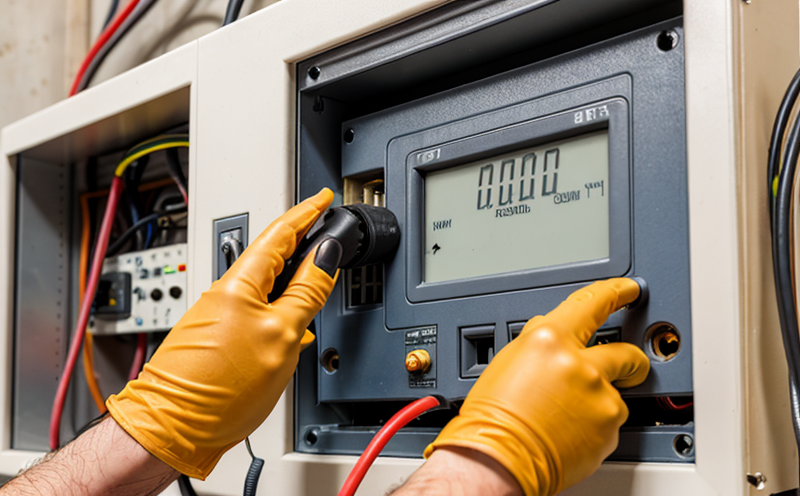JIS C8512 Functional Testing of Alkaline Manganese Batteries
The JIS C8512: 2013 standard defines the methods for functional testing of alkaline manganese batteries. This service ensures that batteries meet stringent performance criteria, validating their suitability for a range of applications from consumer electronics to industrial devices.
Functional testing under JIS C8512 focuses on evaluating the battery's ability to perform its intended function in line with specified conditions. The standard specifies detailed test procedures aimed at assessing the electrical characteristics and operational reliability of alkaline manganese batteries, including open-circuit voltage (OCV), short-circuit current, internal resistance, and self-discharge rate.
The testing process involves precise measurement techniques to ensure accuracy and repeatability. Batteries are subjected to a series of controlled conditions that simulate real-world usage scenarios, providing comprehensive insights into their performance under various load conditions, temperature ranges, and storage periods.
One critical aspect of this testing is the evaluation of battery integrity throughout its lifecycle. This includes assessing the battery's ability to maintain its rated capacity over time, ensuring long-term reliability and safety. Additionally, the functional tests can identify any potential defects or weaknesses that may arise during manufacturing or subsequent use, allowing for timely corrective actions.
For compliance officers and quality managers, this service is indispensable as it provides a clear path towards meeting regulatory requirements and industry standards. By adhering to JIS C8512, manufacturers can ensure their products meet the highest levels of performance and safety, thereby enhancing customer satisfaction and brand reputation.
R&D engineers benefit greatly from this testing by gaining valuable data that informs product development and improvement efforts. Understanding how batteries behave under specific conditions allows for the refinement of designs to enhance efficiency, durability, and overall quality.
Procurement teams can leverage the results of these tests when selecting suppliers or evaluating new products. Ensuring that only compliant and high-performing batteries enter their supply chain is crucial for maintaining product integrity and market competitiveness.
The functional testing process typically involves several key steps:
- Initial charging to standardize battery state
- Measurement of initial OCV, short-circuit current, internal resistance, and self-discharge rate
- Subjecting the battery to a series of load tests at different temperatures
- Monitoring performance over time under specified storage conditions
- Final verification of all parameters against JIS C8512 criteria
The testing apparatus used in this process includes precision measurement tools capable of accurately recording and analyzing the electrical characteristics of the batteries. This ensures that every test is conducted with utmost precision, providing reliable data for evaluation.
Compliance with JIS C8512 standards not only enhances product quality but also fosters trust among end-users and stakeholders. By ensuring that products meet these stringent requirements, manufacturers demonstrate a commitment to excellence in design, manufacturing, and performance.
Eurolab Advantages
At Eurolab, our expertise in JIS C8512 functional testing of alkaline manganese batteries is complemented by state-of-the-art facilities and experienced technical staff. Our services offer several key advantages:
- Precision Measurement: Utilizing advanced instrumentation ensures accurate and consistent results.
- Comprehensive Testing: We provide a holistic approach that covers all aspects of battery performance, from initial charging to final verification.
- Expertise and Experience: Our team comprises professionals with extensive experience in battery testing and standards compliance.
- Rapid Turnaround: Leveraging our efficient processes allows for quick turnaround times without compromising on quality.
- Compliance Assurance: We help ensure that all products meet the required JIS C8512 criteria, facilitating smoother regulatory compliance.
Our commitment to excellence and continuous improvement ensures that you receive reliable, high-quality testing services. Partner with Eurolab for comprehensive support in navigating the complexities of battery testing under JIS C8512 standards.
Customer Impact and Satisfaction
- Enhanced Product Quality: By adhering to JIS C8512, customers ensure that their products meet stringent performance criteria, thereby enhancing overall quality.
- Increased Customer Trust: Compliance with international standards fosters trust among end-users and stakeholders.
- Competitive Edge: Demonstrating a commitment to excellence in design, manufacturing, and performance can set products apart in the market.
- Regulatory Compliance: Ensuring that all products meet the required JIS C8512 criteria facilitates smoother regulatory compliance.
Clients of Eurolab benefit from our comprehensive testing services, which not only enhance product quality but also contribute to increased customer satisfaction and brand reputation. Our focus on precision measurement, comprehensive testing, and expert staff ensures that every test is conducted with utmost accuracy and reliability.
Environmental and Sustainability Contributions
- Eco-Friendly Testing: Our state-of-the-art facilities are designed to minimize environmental impact during the testing process.
- Sustainable Practices: By ensuring product compliance with JIS C8512 standards, we contribute to reducing waste and promoting sustainable manufacturing practices.
- Resource Efficiency: The precision of our tests ensures that resources are used efficiently without compromising on quality.
At Eurolab, we recognize the importance of environmental stewardship. Our commitment to green practices extends beyond individual projects to encompass a broader approach to sustainability. By ensuring compliance with JIS C8512 standards, we contribute to reducing waste and promoting sustainable manufacturing practices.





